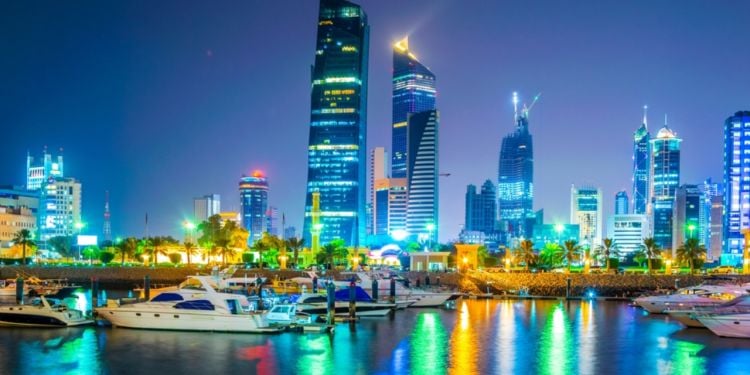
One of the first things you will need to take care of when moving to Kuwait is your accommodation. If you're coming for work, the company you are working for might give you temporary accommodation for a limited time while you find your own space.
Many employers include accommodation for their employee and family in their salary package. If you prefer to find your own housing in Kuwait, these employers typically offer a stipend for your rent. It is recommended to move into the employer provided apartment (if available) on arrival in Kuwait and then begin searching for an alternative apartment if desired.
When it comes to furnishing, you can choose whether you would like to rent somewhere that is already furnished or go with something that is unfurnished. Furnished apartments in Kuwait include everything that you will need and usually even include kitchen accessories and bathroom towels. Unfurnished apartments are completely unfurnished. They include no appliances (stove top/oven, refrigerator, dishwasher, washer and dryer, closets) and no furniture. Some apartments are partially furnished and include only the appliances.
Types of accommodation in Kuwait
Depending on your budget and the amount of space you need, you will find that there is a range of options with regards to the types of accommodations available for rent in Kuwait.
Apartments
Apartments are the first choice for many, especially those who prefer living in the city. These can range from simple one-bedroom units to more luxurious, multi-bedroom apartments with high-end amenities like swimming pools, gyms, and 24-hour security. A large number of apartments come furnished, which is beneficial for expats who might not want to spend too much on furniture. However, it's recommended to inspect the furniture's quality, as it can vary widely. In prime locations like Salmiya and Hawally, high-rise buildings offer stunning views of the cityscape and the Arabian Gulf.
Villas
Villas are the right choice for you if you're looking for more space and privacy than an apartment can provide. They're ideal for families or individuals who prefer a standalone home. It's common for villas in Kuwait to come with gardens, private parking spaces, and sometimes even swimming pools. They're usually situated in residential areas both within and outside the city. For instance, the neighborhoods of Jabriya and Salwa are well-known for their spacious villas and family-friendly atmosphere. When renting a villa, it's important to consider maintenance responsibilities, as large properties may require more upkeep.
Shared accommodation
For those on a budget or looking to save money, shared accommodation is another option. Going for shared accommodation in Kuwait involves renting a room in a larger apartment or villa. This option not only reduces costs but also offers the chance to meet new people and build a community, which can be especially valuable for newcomers. If you do opt for a shared living situation, it's important to establish clear agreements on shared expenses and house rules to avoid any potential disagreements in the future.
Serviced apartments
Serviced apartments are a great option if you're looking for something short-term before committing or for those who prefer to have hotel-like amenities. These are fully furnished and include services such as housekeeping, laundry, and sometimes even dining options. They tend to be more expensive than regular apartments, but offer convenience and flexibility.
Cost of accommodation in Kuwait
Accommodation prices in Kuwait vary depending on the location and whether it is furnished or not. Villas are typically more expensive than apartments. However, if the villa is located a bit further away from the city, you can find a better price.
Below are approximate rental costs in Kuwait:
- 1 bedroom apartment - 290 KWD - 800 KWD per month;
- 3 bedroom apartment - 413 KWD - 570 KWD per month;
- Large villa - 1,000 KWD - 2,000 KWD per month.
Utilities
Another cost you would usually need to consider is water and electricity bills. In Kuwait, the government heavily subsidises utilities, so the amount you pay is incredibly low (around 60 KWD—80 KWD annually). If you have a gas stove/cooker, you purchase re-fillable gas tanks on your own (around 1.5 KWD).
Maintenance costs
Before signing a lease agreement in Kuwait, it's a good idea to clarify with your landlord who is responsible for maintenance and repairs. Some landlords may include this in the rent, while others may require tenants to cover minor repairs. Agreeing upon this at the start helps avoid unexpected charges down the line. Make sure you have contact information for reliable maintenance services. Your landlord might have a specific company they prefer to deal with.
Furniture and appliances
If you've opted for an unfurnished or partially furnished unit, furniture and appliances are another cost on the list. Kuwait has a lot of furniture stores, ranging from high-end to budget options. Stores like IKEA and Home Centre offer furniture and household items to suit different budgets and tastes. For more upscale furniture, Crate & Barrel is a popular choice.
There are many groups on social media and forums for expats to buy or sell furniture. This can be very helpful if you're considering an unfurnished apartment.
Popular areas for expats in Kuwait
To narrow down your house hunt in Kuwait, you'll first need to decide what areas you're interested in living in. There are a few areas which are popular among expats based on the cost of rent, convenience of the area, and overall quality of life.
Kuwait City
Kuwait City is the bustling center of the country and the hub of commercial and social activity. Areas like Salmiya, Hawally, and Bneid Al Qar are popular among expats due to their close proximity to shopping centers, restaurants, and entertainment venues. These areas offer a mix of high-rise apartments and villas. Salmiya and Bneid Al Qar are particularly favorable locations for those who like to live closer to the beach.
Fintas and Mahboula
If you don't mind venturing a little farther out from the city center, Fintas and Mahboula are great areas to find more affordable living spaces. These areas used to be more popular among expats working in the oil sector or at the many international companies located there. However, they are now attracting lots of different people due to their low rental costs. Fintas and Mahboula offer a range of accommodation options, including more affordable apartments and villas.
Jabriya and Salwa
Jabriya and Salwa are residential neighbourhoods that are preferred by families due to their quieter atmosphere and proximity to international schools and healthcare facilities. They offer a variety of villas and larger apartments suitable for family living. Jabriya also has its own little commercial centre, where you'll find a host of cafes and restaurants, boutique stores and beauty salons.
Egaila and Abu Halifa
Two other further out areas are Egaila and Abu Halifa, which offer a mix of villas and apartments. These neighborhoods are also becoming increasingly popular due to their relatively lower rental prices and growing infrastructure. Egaila and Abu Halifa offer a more relaxed lifestyle compared to the bustling city center and have good access to beaches and recreational facilities.
Finding accommodation in Kuwait
After scoping out the areas you'd like to live in, you'll need to set a realistic budget based on your property needs. Once you have this, you can either opt to search for properties independently online through websites like Sakan and Dubizzle, or opt to use a real estate agent.
There are many realtors in Kuwait, and most apartment buildings have signs displaying the management company name and phone number. Management companies employ building managers who are usually present at the property during the daytime and evening hours. In addition to the building manager, the majority of apartment buildings have a security guard on site at night, monitoring the security cameras. Building managers do not always speak English well, so obtaining some information, such as whether they allow dogs, can be difficult.
Working with a realtor can help circumvent the language barrier. Realtors can also drive you to the locations of available apartments, which can be quite helpful if you're looking for an apartment before you get a car. Viewing properties is crucial in order to inspect them in person. It's important to pay attention to the overall condition of the property, including the quality of furnishings, the functionality of appliances, and any signs of wear and tear. It also gives you the opportunity to inspect the neighborhood, taking into consideration factors such as traffic, noise levels in the area, and the convenience of nearby services.
You'll find that rental prices in Kuwait are often negotiable, so don't hesitate to bring this up with your real estate agent. When you work with a realtor, the payment is typically one-half of one month's rent for the apartment you decide to rent. Apartments require one month's rent deposit and usually an additional pet deposit if applicable, just as you would find in the United States, for example.
When you find the property you'd like to rent out, you will need to sign a lease agreement. Carefully read through the lease agreement to ensure that it's clear and includes all terms and conditions, such as the duration of the lease, the rent amount, payment schedule, and responsibilities for maintenance and repairs. It's recommended that you keep a copy of the lease agreement in both English and Arabic.
Lease durations in Kuwait are usually 12-13 months long. A shorter lease agreement can be arranged but will usually come with an additional monthly fee. Most landlords require a 30-day notice if you're planning to vacate at the end of your lease term.
As mentioned above, you will also need to make a security deposit when renting a property in Kuwait. This deposit is typically equivalent to one or two months' rent and is refundable at the end of the lease period, provided there are no damages to the property. Make sure to document the condition of the property when you move in to avoid any disputes when you move out. It's also a good idea to request a receipt of the security deposit from the landlord.
Good to know:
It is perfectly acceptable to walk into a building and ask the building manager to see an apartment.
Other things to consider when renting accommodation in Kuwait
There are a few other key things to keep in mind when looking for accommodation in Kuwait to ensure a smooth and easy process.
Valid residency permit
To rent a property in Kuwait, you will need a valid residency permit (Iqama). This permit is usually sponsored by your employer. Without a residency permit, you will not be able to sign a lease agreement. Ensure that your residency permit is up to date and that you have all the necessary documentation before starting your search for accommodation.
Legal rights and protection
Tenants in Kuwait have certain legal protections under Kuwaiti law. For instance, landlords cannot arbitrarily increase rent during the lease period without mutual consent. If you encounter any legal issues with your landlord, it's advisable to seek legal advice or contact the local municipality for assistance. Familiarize yourself with your rights and obligations as a tenant to avoid potential conflicts.
Registering your lease agreement
In some cases, landlords may require tenants to register the lease agreement with the local municipality. This process ensures that the contract is recognized by the authorities and can provide additional legal protection for both parties. Check with your landlord or real estate agent if this is necessary for your lease agreement.
Good to know:
Expats are not allowed to purchase property in Kuwait, though proposals are being discussed to change this.
Useful links:
We do our best to provide accurate and up to date information. However, if you have noticed any inaccuracies in this article, please let us know in the comments section below.








